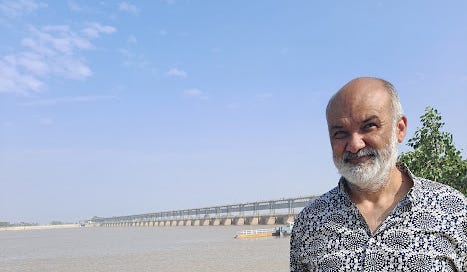Water Wars: How Punjab's Canalization Threatens Sindh's Ecosystems and Agriculture
Veterinarians Can Play An Important Role In Resolving The Indus Water Dispute.
Water, often dubbed "the new oil," surpasses oil's value by being an essential resource critical to the survival of ecosystems, agriculture, and human populations. The ongoing dispute in Pakistan over water rights exemplifies the gravity of water scarcity, an urgent ecological crisis. Punjab Province's canalization of the Indus River significantly threatens the fragile ecosystems and agricultural sustainability of Sindh Province, turning an ostensibly political dispute into an alarming environmental crisis that demands immediate attention.
The canalization process initiated by Punjab substantially reduces the water flow into Sindh, critically impacting the province's delicate ecosystems, particularly the Indus Delta. Reduced freshwater inflow increases salinity levels, devastating habitats essential for species such as the endangered Indus River dolphin, migratory birds, and numerous fish species. The resulting ecological imbalance can lead to biodiversity loss, disrupting food chains and ecosystem services vital for environmental health.
Agriculture in Sindh, heavily dependent on the consistent supply of fresh water from the Indus, faces severe threats from decreased water availability. This reduction compromises crop yields, diminishes soil fertility due to increased salinity, and exacerbates food insecurity, affecting millions of farmers and local communities reliant on agriculture for their livelihoods. The potential economic impact of this crisis on Pakistan's GDP is significant, further underscoring the urgency of the issue.
While the issue may superficially appear political, its profound ecological ramifications highlight its true nature as an environmental emergency. The impact on biodiversity, habitat destruction, soil degradation, and loss of agricultural productivity underscores the necessity of reframing this conflict as an urgent ecological challenge requiring international attention.
Involving international ecological groups in this dispute is beneficial and critical. These organizations can offer impartial assessments and scientific expertise and facilitate mediation between provincial interests, promoting sustainable water management practices. Their engagement is helpful and necessary to elevate global awareness, encourage responsible governance, and help establish ecological restoration initiatives to mitigate environmental harm.
Furthermore, veterinarians in both Punjab and Sindh provinces have an essential role in addressing this crisis. Their unique position allows them to advocate for wildlife conservation, monitor animal health affected by ecosystem disruptions, and contribute to comprehensive environmental assessments. Their involvement is beneficial and crucial, ensuring the holistic health of ecosystems, livestock, and wildlife populations.
In conclusion, Pakistan's water resources, particularly those of the Indus River, belong collectively to all Pakistanis, not exclusively to influential factions within Punjab. This collective ownership reinforces the need for equitable and sustainable management, crucial for preserving ecosystems, agriculture, and the livelihoods of millions. Recognizing water as a shared heritage rather than a provincial entitlement is paramount to Pakistan's environmental integrity, economic stability, and social justice.



